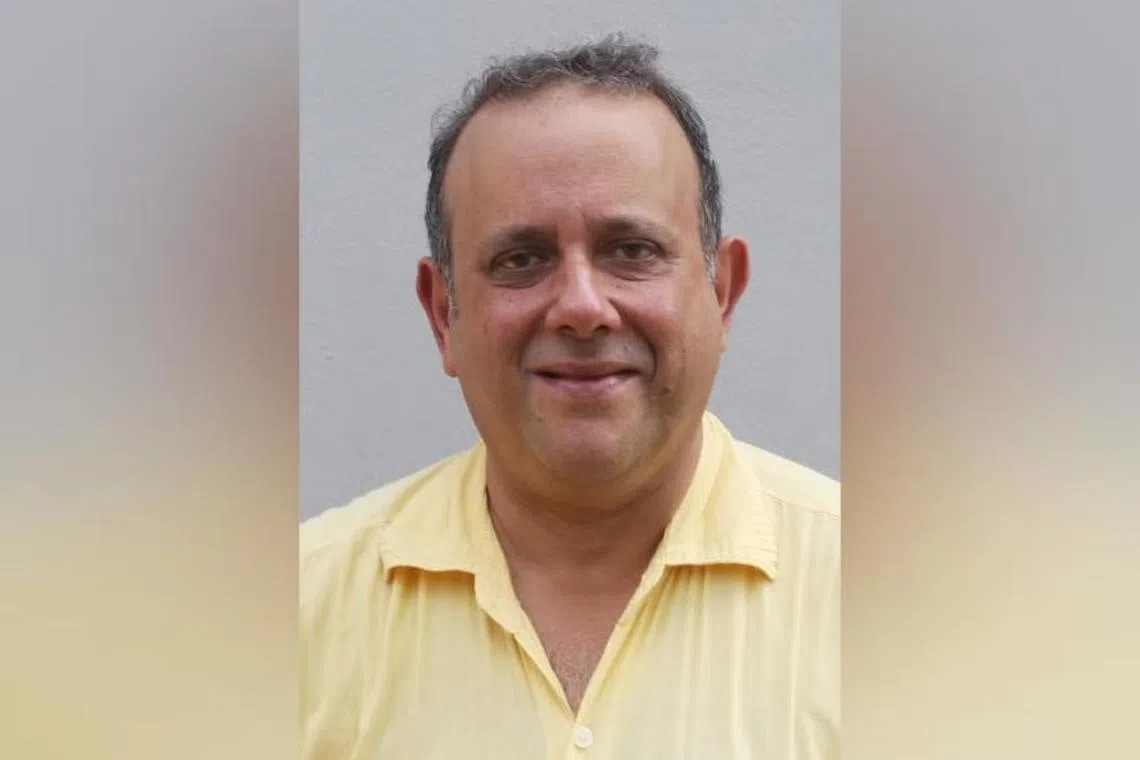Pofma Office issues correction direction to Kenneth Jeyaretnam
Sign up now: Get ST's newsletters delivered to your inbox

This is the fifth time Reform Party chief Kenneth Jeyaretnam has been issued such a direction.
PHOTO: LIANHE ZAOBAO FILE
SINGAPORE - Reform Party chief Kenneth Jeyaretnam has been ordered to put up corrections under the law against fake news, over false statements he made about Singapore’s reserves, healthcare spending, and the rental of two black and white bungalows by two ministers.
This is the fifth time Mr Jeyaretnam has been issued such a direction.
The Ministry of Finance (MOF) said on Thursday that Deputy Prime Minister and Minister for Finance Lawrence Wong had instructed the Protection from Online Falsehoods and Manipulation Act (Pofma) Office to issue a correction direction to Mr Jeyaretnam in relation to his article on The Ricebowl Singapore, Facebook, Instagram, LinkedIn and X, published on Oct 22.
In the article, titled “Dear Lawrence Wong Stop Talking Like You’re a Hot Shot Investment Banker and Start Explaining to Singaporeans How the Reserves Benefit Them”, Mr Jeyaretnam had asserted that most of the returns from investing Singapore’s past reserves were transferred into long-term funds, and thus did not contribute to actual spending.
Rebutting this in a statement on the Government’s Factually website, MOF said that the Net Investment Returns Contribution, or NIRC, and operating revenue make up the total revenue that is used to meet annual public spending.
The NIRC has provided an annual revenue stream of about 3.5 per cent of gross domestic product on average over the past five years, said MOF. For the financial year that ended on March 31, 2023, the NIRC was approximately $22.4 billion.
MOF said it is incorrect to state that most of the NIRC has been transferred into long-term funds, as “no proportion of the NIRC is earmarked for specific spending items, or for transfer into any specific funds”.
Instead, a portion of the annual Budget as a whole may be used to top up such funds, it added.
MOF also said it is false to claim that money set aside in the long-term funds does not contribute to “actual spending”, since the money does contribute to the disbursements from such funds.
These funds are typically set up to support the long-term spending commitments made by the Government, such as for the Majulah Package,
Mr Jeyaretnam had also asserted in his article that the Singapore Land Authority (SLA) had given preferential treatment to Home Affairs and Law Minister K. Shanmugam and Foreign Minister Vivian Balakrishnan by renting out two state properties to them below market value while charging the Housing Board high prices for land.
MOF said this was untrue, countering that “the CPIB (Corrupt Practices Investigation Bureau) had found that no preferential treatment was given to the ministers and there was no evidence to suggest any abuse of position by the ministers for personal gain”.
A review by Senior Minister Teo Chee Hean
Reiterating the findings of the CPIB investigation and Mr Teo’s review, MOF said rental paid by both ministers was not less than the guide rents for the properties, which were determined by professional valuers based on established principles and methods for valuation.
Also, the valuer did not know Mr Shanmugam was the prospective tenant for 26 Ridout Road at the time the valuation was done, and had learnt of his identity only after the matter was reported in the media, said MOF.
Noting that these details had been disclosed in Parliament, MOF said Mr Shanmugam had recused himself in respect of the rental transaction.
On the issue of how SLA sells state land to HDB for the development of public housing, MOF said this is done at the fair market value, assessed by the chief valuer, and not SLA.
“The underlying principle used by the Government for determining the value of land for sale to the public and for rental of the Ridout Road properties is the same – it is to transact at fair market value,” said MOF.
“Whether for short-term rental or longer-term sale, the valuation seeks to establish the price that the market is willing to pay in each case, so that the Government transacts at fair market value.”
MOF said Mr Jeyaretnam had made similar false statements of fact about the matter in earlier publications “that have already been clarified”.
“He continues to make such statements with utter disregard for the facts. He repeatedly omitted the facts and clarifications, rather than provide them and let the readers draw their own conclusions,” said the ministry.
“Mr Jeyaretnam’s campaign of posting false statements misleads Singaporeans on the way that SLA works, as well as on the state’s land sale and property rental policies.”
Mr Jeyaretnam had also said in his article that of the $17 billion in healthcare expenditure here, only $8 billion was used as subsidies for Singaporeans, a claim that MOF said was untrue.
There was no factual basis for these claims, said MOF, citing how healthcare expenditure in the last three financial years ranged from $16.88 billion to $17.32 billion per year, and subsidies for Singaporeans ranged from $9.54 billion to $10.93 billion per year.
The ministry noted that this information is publicly available in the Government Budget Book.
It also said that excluding Covid-19 expenditure, which is transitory, more than 70 per cent of total healthcare expenditure was spent on subsidies for Singaporeans.
MOF also took issue with other issues that Mr Jeyaretnam raised in his article, making “additional clarifications” in its statement.
It noted that the article states that the Government uses “subsidies from the Budget for HDB purchases to enable HDB to pay a higher price for land”, and that Singaporeans pay “inflated prices for smaller and smaller HDB units”.
In its clarification, MOF said state land is disposed of at fair market value, determined by the chief valuer, and this valuation does not factor in housing subsidies or grants provided by HDB.
The ministry also rejected the claim that HDB sells flats at “inflated prices”, noting that Built-To-Order flats are priced to “ensure affordability”. It added that HDB takes into consideration the prices of comparable resale flats nearby, then applies a significant subsidy to the assessed market values.
In addition, MOF said HDB flat sizes have not changed since 1997, but average household sizes have decreased.
Under the correction direction, Mr Jeyaretnam will have to publish a correction notice at the top of his article on The Ricebowl Singapore, and on his posts on Facebook, Instagram, LinkedIn and X, along with a link to the Factually statement.



